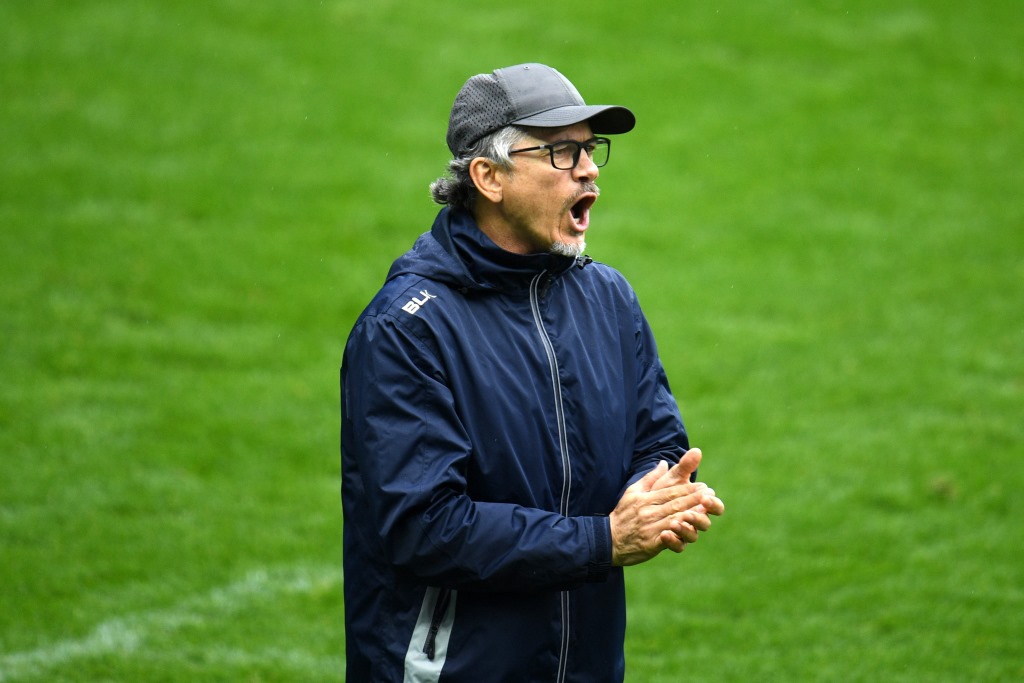
London Irish head coach, former Ireland assistant and proud Aussie Les Kiss talks to NEALE HARVEY about life with the Exiles, his growth as a coach and how he sees the game in general.
How have London Irish been coping with lockdown?
Managing people through different formats and virtual meetings is a novel way to communicate but from that point of view, I think it’s helped develop other skillsets in getting messages across, developing relationships and getting a shared view of how things look. Our director of rugby, Declan Kidney has needed to keep an eye on players and staff and that’s been a big thing for him – making sure there’s been engagement in every way he possibly can.
Even if there’s furlough status there are ways for players, coaches and staff to stay in touch as mates and, hopefully, people have been helping each other to stay motivated and those strengths will come through there. There’s no A, B or C manual about how this should be handled but good people will get stronger.
Have you been encouraged to see Rugby League bouncing back in Australia?
I watched the football when it restarted in Germany and have really got into the NRL now. The way the football looks is good and in NRL they’ve used virtual crowd sounds, which I think is a great idea. There are people in Australia I keep in touch with and the pre-game processes and training processes they’ve built in are making things as safe as possible. Over the next week or two, hopefully we’ll start seeing some good outcomes here as we get back into training. New Zealand and Australia are well ahead of us but we can all take a cue from them.
It’s just over two years since you and Declan took charge at Irish, how have you enjoyed it?
Dec and I were recently talking about when we first joined the project. We lived in an Airbnb above a Costcutters shop for a few weeks until we got our feet on the ground and had a chuckle about that, but we’re really happy with the decision we made to come and where we’ve got to since. A team isn’t something that happens by chance, we’ve tried to put things in place and put a marker on it where we build something good that has a bit of longevity in it. It’s obviously not ideal what’s been happening around this last third of the season, however we’ve got a lot out of the campaign so far and personally I’ve loved my first proper crack at the Premiership. It’s a great club to be involved with.
It was awkward with club legend Nick Kennedy leaving soon after you joined, but what did you inherit?
There were circumstances that were not in our control but a lot of good things had been put in place that we could build on. We’ve put our own flavour on things, as any coaches would, but the majority of the staff we inherited are still here – guys like Declan Danaher and George Skivington, many of the backroom medics and physios and the academy group of players – so there’s a lot of continuity that’s come through. It’s encouraging that they all bought into what we were about.
Relegation was unavoidable when you arrived but what did you make of the Championship?
As we built in the Championship, I found it was a brilliant way to get engaged with English rugby. I’d never really been involved here before and neither had Declan, so to see the game through the eyes of the Championship was tremendous for us. It keeps you grounded and you understand where the game comes from. Our aim was to get back to the Prem and stay there – so far, it’s gone okay.
Did a year in the Championship enable you to build at a pace that allowed younger lads to shine?
That’s a good way to put it because we had to make sure we put in place something where those young players wanted to stay and feel part of it, which is central to where this club wants to go. We’d lost players in the past, that’s been recognised over the last decade, so it was important that the group of players that Declan Danaher and George Skivington had helped bring through wanted to stay for the future. We managed to do that for the most part and as we’ve seen through guys like Ollie Hassell-Collins, Ben Loader, Ben Donnell, Matt Williams, Tom Parton and others like Phil Cokanasiga coming onto full contracts, they’re integral to where we’re going.
That’s very important but we also knew that we had to make them feel sure it was somewhere to stay and you can see by the signings we’ve made that we have a good blend right through the squad. Those young guys can see people who’ve been there and done it and know we can compete, so, hopefully, over the next two to five years that will transfer into some really good things happening.
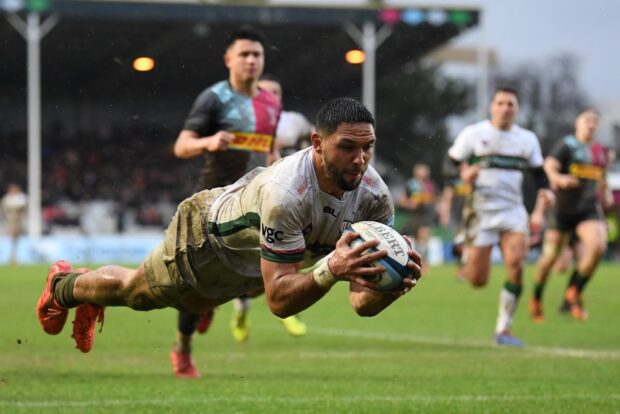
Most of your big-name signings like Adam Coleman, Curtis Rona and Waisake Naholo have paid off, you must be pleased with that?
One of the big things is the type of player you’re bringing in. Every coach talks about the character of a player and what value he’ll add, but the blend of what we’ve brought in is really good and it enhanced what we already had here.
You’ll never get those things 100 per cent right and there’s always a margin of guesswork, but, ultimately, we were comfortable with what those players brought and they’ve all delivered, which is a big plus. It’s just been unfortunate that this last third of the year has been disrupted because it was going to be another step up in terms of where we wanted to go. Players came in after the World Cup and we were working them into the team along with guys like Sean O’Brien, but we’ll continue that when things restart. There’s a couple of announcements to be made regarding personnel, too, but we’ll do that at the right time.
How grateful have you been for the financial support of your owner, Mick Crossan?
Hugely so. Because of the pandemic we’ve missed out on some really big money-spinning games like Paddy’s Day and what would have been our last game at the Madejski Stadium this weekend, but the management have done a fantastic job and the confidence they’ve given the group that we’ll get through this has been magnificent. Mick’s backing is certainly well appreciated. These are challenging times and no one has an exact answer on how the future might look, but we’re confident that a lot of good things will keep happening here.
Prior to the shutdown, how pleased were you to be lying two points off the top six having claimed big scalps in Leicester, Northampton and Harlequins?
We’ve been reviewing a lot and while most of it has been positive, that comes with an understanding of where we need to grow. One of the challenges was starting the season with the majority of the group who came through the Championship year, but we played well and the next challenge was integrating guys like Coleman, Nick Phipps and Sekope Kepu. Against Northampton and Harlequins, we showed a lot of where we are and how we wanted to play – even against Wasps at home when we eventually lost. But then our last match against Sale (lost 39-0) turned ugly for us and that’s part of the learning process, too.
We made errors and they were clinical which showed us where we need to grow, but we’ve got a good group who are diligent and are starting to learn what it takes to be a winning team rather than one that just participates. We’re learning about pressure in the Premiership and it’s a different style of game to where some of our new players have come from, but all things considered we’ve rolled along pretty well.
On a personal note, this is your 12th year coaching in Europe since leaving Sydney. Enjoying the ride?
It’s been fantastic and I’m grateful for the fact my family were willing to give Europe a go. My kids spent formative years here and are having wonderful lives now and from a life perspective my wife Julie and I have loved the experiences we’ve had. From a rugby perspective, I don’t know if I’d have grown as a coach the way I have because from being a technocrat I’ve developed a broader vision of the game. It’s been a great experience, for sure.
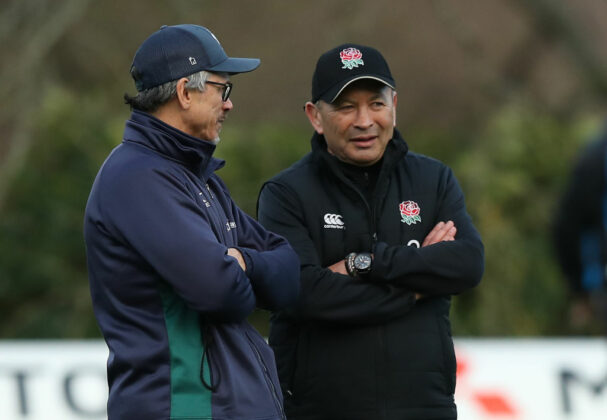
Can you define what you mean by ‘technocrat’?
When you are a new coach you tend to get into every technical detail of the game but you can lose yourself down a cul-de-sac where real heavy detail gets the job done but there’s an emotional, intuitive and creative part that if you’re too technical you can close off. If you’re too prescriptive or too sequential and everything has to follow in order, all you have is a left to right approach, whereas you really need to be multi-dimensional.
As you grow as a coach, you realise that if you see another schematic or model that’s working for another club and think you can just cut and paste it into your environment, it doesn’t work like that. Every environment, every team has a different nature to it and you need to understand that however much technical detail you might have, the collective and cohesive forces in a team are the massive things.
You can’t coach attitude so if you’re too detailed and players lean on that to a heavy degree, they forget how to see and feel a game. You have to get that consensus across the skillsets so you hit the sweet spot as often as possible, and you only grow into that from being a young coach to an older coach. You’ve got to put an environment in place that is central to how the players want to play and where they can be in charge for 80 minutes – and you gain that experience as a coach when you’ve been through the mill a bit!
English rugby is always dismissed as too prescriptive, but do you see enough expansive young coaches like Sam Vesty and Lee Blackett around now to persuade you that is changing?
There’s a real understanding within the league of where rugby can grow and there’s more and more happening now around coach education and the networking you can do to explore how you can enhance that intuitive, creative process I was talking about. You’ll always get players who can do beautiful work between four cones in training, but can they see space, feel opportunities and construct something and know how to attack it so it becomes the perfect picture? Players have to be central to what you’re trying to build but I do see that happening now and that’s credit to the coaching mindsets. Take the big gems from other programmes, but don’t just cut and paste.
What changes would you make to the way the game’s played?
I’d keep the choke tackle, for sure!! (laughs). The big things will stay in place but I’d definitely like to see the game quicken up. I’m not saying it’s not a quick game now but there are components that can stymie it around scrum resets and it would be nice to get an understanding of how we can make that better. I like the concept of the 50-22 and 22-50 kicks and if you can get the ball to the sideline on the bounce; I think that would be a wonderful innovation that would open up the game. Another area I’d like to see improved is ensuring some real consistency around how the breakdown is refereed.
There’s a working group that’s come into play over that in the last six months and, hopefully, we can referee the laws in a more direct way. It’s easy to say, harder to do, but if we get enough good heads together, we can do it. I’d probably hurry-up the No.9s a bit, too.
Having coached at Ulster before, how have you found the Premiership compared to PRO14?
Totally different in terms of pressure. Most top teams in the PRO14 know they’re going to qualify for the Champions Cup, and with no relegation it’s just different. It doesn’t mean one is better than the other but there are other factors you have to handle in the Premiership that make you think and prepare differently. The consequences of failure in the Premiership make it tougher to manage but I’ve really enjoyed this league. From the Championship and experiencing the coalface there to the Premiership now, it’s an exceptional league set-up.
At 55, do you have any ambitions to get back into Test rugby?
I’ve always had an open mind. In our business there’s not a lot of certainty so you have to be comfortable in the domain of knowing anything can happen. My immediate ambition is to grow something special at London Irish with Declan and we work closely on that, living in each other’s pockets really. But beyond that my previous international experience with Ireland was exceptional and I’d love to get involved in that again one day.
Back to London Irish, how much are you looking forward to the move to Brentford?
The whole focus now is on making sure we manage this process and what Declan wants to build with this team. We want to be sustainable as a club, focussed on good growth and Brentford is central to that. While it’s not a game-breaker for the club, it’s certainly a big opportunity. Hopefully, crowds will be allowed back because the move could be something special for the club and I know those younger boys who want to stay with us are excited by it.
The academy’s working hard and we want to really connect with our fans as a London-based club that trains and plays within the M25. We’ve had a few boys talked about as England prospects and we want to facilitate those ambitions. We have a lot of good English boys and some top, top-quality players from elsewhere as well, so it’s a great opportunity for everyone to put their hands up and show what this club is about.
The latest edition of @TheRugbyPaper is coming your way this weekend…
— The Rugby Paper (@TheRugbyPaper) April 16, 2020
3️⃣ months for £15.99
6️⃣ months for £29.99
1️⃣2️⃣ months for £49.99
Your essential Sunday read #TRP Get your copy: https://t.co/AJQy8FqV8u pic.twitter.com/K7hSvR0xcx


British and Irish Lions
Charlie Elliott: The 17 backs I would select for the British and Irish Lions

















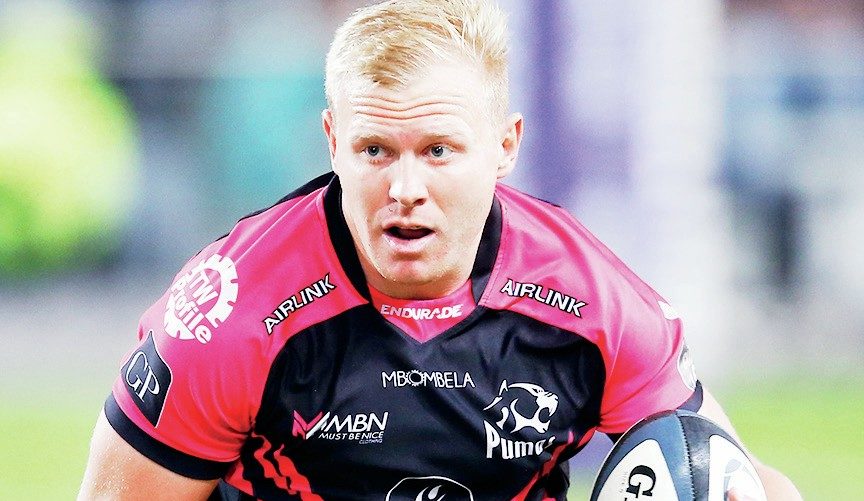
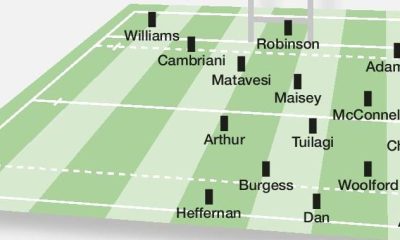

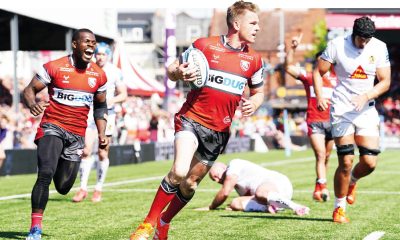

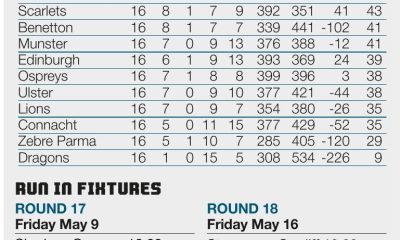

You must be logged in to post a comment Login